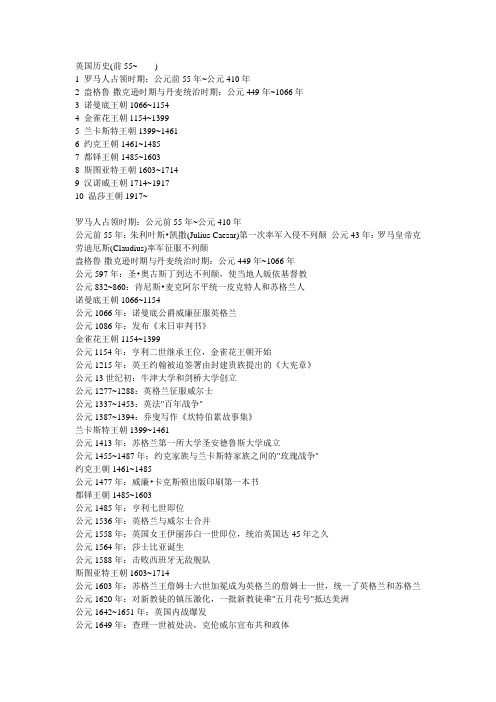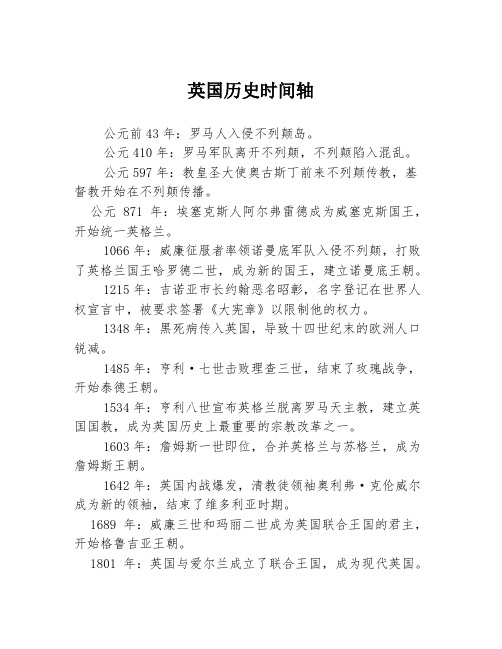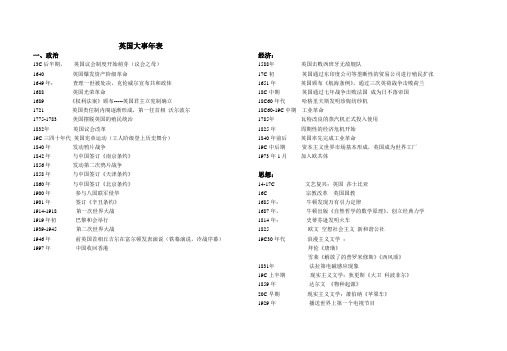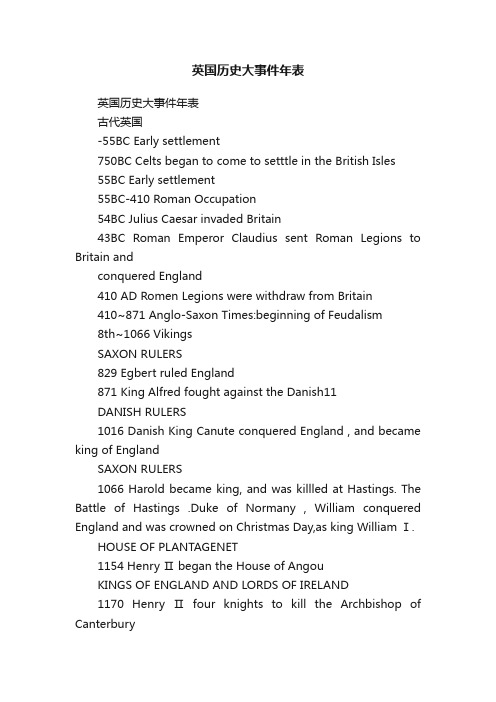(完整版)英国历史大事年表
英美历史大事年表

英国历史(前55~ )1 罗马人占领时期:公元前55年~公元410年2 盎格鲁-撒克逊时期与丹麦统治时期:公元449年~1066年3 诺曼底王朝1066~11544 金雀花王朝1154~13995 兰卡斯特王朝1399~14616 约克王朝1461~14857 都铎王朝1485~16038 斯图亚特王朝1603~17149 汉诺威王朝1714~191710 温莎王朝1917~罗马人占领时期:公元前55年~公元410年公元前55年:朱利叶斯•凯撒(Julius Caesar)第一次率军入侵不列颠公元43年:罗马皇帝克劳迪厄斯(Claudius)率军征服不列颠盎格鲁-撒克逊时期与丹麦统治时期:公元449年~1066年公元597年:圣•奥古斯丁到达不列颠,使当地人皈依基督教公元832~860:肯尼斯•麦克阿尔平统一皮克特人和苏格兰人诺曼底王朝1066~1154公元1066年:诺曼底公爵威廉征服英格兰公元1086年:发布《末日审判书》金雀花王朝1154~1399公元1154年:亨利二世继承王位,金雀花王朝开始公元1215年:英王约翰被迫签署由封建贵族提出的《大宪章》公元13世纪初:牛津大学和剑桥大学创立公元1277~1288:英格兰征服威尔士公元1337~1453:英法"百年战争"公元1387~1394:乔叟写作《坎特伯累故事集》兰卡斯特王朝1399~1461公元1413年:苏格兰第一所大学圣安德鲁斯大学成立公元1455~1487年:约克家族与兰卡斯特家族之间的"玫瑰战争"约克王朝1461~1485公元1477年:威廉•卡克斯顿出版印刷第一本书都铎王朝1485~1603公元1485年:亨利七世即位公元1536年:英格兰与威尔士合并公元1558年:英国女王伊丽莎白一世即位,统治英国达45年之久公元1564年:莎士比亚诞生公元1588年:击败西班牙无敌舰队斯图亚特王朝1603~1714公元1603年:苏格兰王詹姆士六世加冕成为英格兰的詹姆士一世,统一了英格兰和苏格兰公元1620年:对新教徒的镇压激化,一批新教徒乘"五月花号"抵达美洲公元1642~1651年:英国内战爆发公元1649年:查理一世被处决,克伦威尔宣布共和政体公元1660年:查理二世复辟公元1676年:格林尼治天文台设立公元1685年:牛顿发现万有引力定律公元1694年:英格兰银行成立公元1698年:伦敦股票交易所成立公元1707年:英格兰、苏格兰合并,形成"大不列颠王国"汉诺威王朝1714~1917公元1721~1742年:罗伯特•沃尔浦成为英国第一任首相公元1760~1830年:工业革命公元1775~1783年:美国独立战争公元1801年:合并爱尔兰,"大不列颠及爱尔兰联合王国"成立公元1837~1901年:维多利亚时代公元1859年:达尔文发表《物种起源》公元1914~1918年:第一次世界大战温莎王朝1917~公元1921年:爱尔兰独立公元1928年:弗莱明发现青霉素公元1939~1945年:第二次世界大战公元1952年:伊丽莎白女王二世加冕英国历史大事年表--公元前2000-1500年,古印欧人的一支--凯尔特人(罗马人称其为高卢人)西进。
英国历史时间轴

英国历史时间轴公元前43年:罗马人入侵不列颠岛。
公元410年:罗马军队离开不列颠,不列颠陷入混乱。
公元597年:教皇圣大使奥古斯丁前来不列颠传教,基督教开始在不列颠传播。
公元871年:埃塞克斯人阿尔弗雷德成为威塞克斯国王,开始统一英格兰。
1066年:威廉征服者率领诺曼底军队入侵不列颠,打败了英格兰国王哈罗德二世,成为新的国王,建立诺曼底王朝。
1215年:吉诺亚市长约翰恶名昭彰,名字登记在世界人权宣言中,被要求签署《大宪章》以限制他的权力。
1348年:黑死病传入英国,导致十四世纪末的欧洲人口锐减。
1485年:亨利·七世击败理查三世,结束了玫瑰战争,开始泰德王朝。
1534年:亨利八世宣布英格兰脱离罗马天主教,建立英国国教,成为英国历史上最重要的宗教改革之一。
1603年:詹姆斯一世即位,合并英格兰与苏格兰,成为詹姆斯王朝。
1642年:英国内战爆发,清教徒领袖奥利弗·克伦威尔成为新的领袖,结束了维多利亚时期。
1689年:威廉三世和玛丽二世成为英国联合王国的君主,开始格鲁吉亚王朝。
1801年:英国与爱尔兰成立了联合王国,成为现代英国。
1832年:大选改革法通过,扩大了选举权,使更多的人有权参加选举。
1858年:印度成为英国的殖民地。
1914年:第一次世界大战爆发,英国成为同盟国的一员。
1926年:一般性罢工爆发,导致国家陷入麻烦。
1939年:二战爆发,英国成为反法西斯同盟的一员。
1947年:印度从英国独立,成为一个自治国家。
1952年:伊丽莎白二世成为英国现代史上的女王,开始伊丽莎白时代。
1960年:英国加入欧洲联盟。
1982年:英国与阿根廷就马尔维纳斯群岛主权发生武装冲突,英国最终取得胜利。
1997年:英国移交香港主权。
2016年:英国通过脱欧公投,宣布脱离欧洲联盟。
2020年:新冠疫情肆虐,英国成为欧洲受影响最严重的国家之一。
英国大事年表

英国大事年表一、政治13C后半期,英国议会制度开始萌芽(议会之母)1640英国爆发资产阶级革命1649年:查理一世被处决,克伦威尔宣布共和政体1688英国光荣革命1689《权利法案》颁布-----英国君主立宪制确立1721英国责任制内阁逐渐形成,第一任首相沃尔波尔1775-1783美国摆脱英国的殖民统治1832年英国议会改革19C三四十年代英国宪章运动(工人阶级登上历史舞台)1840年发动鸦片战争1842年与中国签订《南京条约》1856年发动第二次鸦片战争1858年与中国签订《天津条约》1860年与中国签订《北京条约》1900年参与八国联军侵华1901年签订《辛丑条约》1914-1918 第一次世界大战1919年初巴黎和会举行1939-1945 第二次世界大战1946年前英国首相丘吉尔在富尔顿发表演说(铁幕演说,冷战序幕)1997年中国收回香港经济:1588年英国击败西班牙无敌舰队17C初英国通过东印度公司等垄断性的贸易公司进行殖民扩张1651年英国颁布《航海条例》,通过三次英荷战争击败荷兰18C中期英国通过七年战争击败法国成为日不落帝国18C60年代哈格里夫斯发明珍妮纺纱机18C60-19C中期工业革命1785年瓦特改良的蒸汽机正式投入使用1825年周期性的经济危机开始1840年前后英国率先完成工业革命19C中后期资本主义世界市场基本形成,英国成为世界工厂1973年1月加入欧共体思想:14-17C 文艺复兴:英国莎士比亚16C 宗教改革英国国教1685年:牛顿发现万有引力定律1687年,牛顿出版《自然哲学的数学原理》,创立经典力学1814年:史蒂芬逊发明火车1825 欧文空想社会主义新和谐公社19C30年代浪漫主义文学:拜伦《唐璜》雪莱《解放了的普罗米修斯》《西风颂》1831年法拉第电磁感应现象19C上半期现实主义文学:狄更斯《大卫科波菲尔》1859年达尔文《物种起源》20C早期现实主义文学:萧伯纳《苹果车》1929年播送世界上第一个电视节目。
英国史大事年表

之后,苏美英举行德黑兰会议,决定开辟第二战场
1944、6,英美诺曼底登陆(“霸王行动”)
1945、2,苏美英举行雅尔塔会议
1945年春,英美盟军强渡莱茵河,在鲁尔区围歼西线德军主力
1945、7,苏美英举行波茨坦会议,并以中美英三国名义发表《波茨坦公告》,督促日本无条件投降
英国史大事年表
时期
重大事件
16世纪
15世纪晚期,推行圈地运动
新航路开辟后,贸易中心由地中海转移到大西洋沿岸(英国伦敦)
1588年,英国海军打败西班牙“无敌舰队”
16世纪后半叶,出现一个新教教派——清教
莎士比亚《哈姆雷特》,文艺复兴进入高潮阶段
17世纪
1600年成立“东印度公司”,垄断中英、印英间的贸易
1920年,国联正式成立,与法国共同操纵
签订《凡尔赛和约》(1919)、《四国条约》(1921)/《五国条约》(1922)/《九国公约》(1922)
1935、10,意大利入侵埃:实行“名不符实”的制裁;1936—1939年,西班牙内战:采取“不干涉”政策
1936年,凯恩斯发表《就业、利息和货币通论》,凯恩斯主义诞生
1840—1842年,挑起鸦片战争,并签订《南京条约》
1850年,英国取得“世界工厂”地位
1851年,举办了第一次世界博览会
1852年,英国议会将自有贸易定为国策
1860年,英法签订一项自由贸易条约,资本主义世界市场逐渐成熟
1856—1860年,挑起第二次鸦片战争
1859年,达尔文《物种起源》出版,提出进化论
1973年,发生经济危机,英国加入欧共体
1979年,撒切尔夫人上台执政,放弃凯恩斯主义,改性货币主义政策
英国历史年表

英国历史年表英国历史年表1、古代- 公元前55年:罗马人入侵英格兰- 公元43年:罗马控制整个英格兰- 407年:罗马人撤离英格兰- 597年:基督教传入英格兰2、中世纪- 1066年:诺曼征服,威廉一世成为英格兰国王- 1215年:签署《大宪章》- 1337年-1453年:百年战争- 1381年:沃特·泰勒领导的人民起义3、文艺复兴时期- 1485年:亨利七世成为英格兰国王,都铎王朝开始- 1534年:国王亨利八世宣布英格兰独立,建立英国国教4、17世纪- 1603年:詹姆斯一世成为英格兰、苏格兰和爱尔兰的国王- 1642年-1651年:英国内战- 1649年:国王查理一世被处决,英国成为共和国- 1660年:帕尔斯居权,英王复辟,开始斯图亚特王朝5、君主立宪制时期- 1688年:光荣革命,威廉三世和玛丽二世共同统治英国- 1707年:英格兰和苏格兰合并成为大不列颠王国6、工业革命时期- 1760年:乔治三世成为英国国王,开始乔治王朝- 1769年:詹姆斯·瓦特发明蒸汽机- 1789年:法国大革命爆发,对英国产生影响- 1801年:英格兰与爱尔兰合并,成为大不列颠及爱尔兰联合王国7、维多利亚时代- 1837年:维多利亚女王登基,开始维多利亚时代- 1867年:英国扩大选举权,给予更多人参政权- 1901年:维多利亚女王去世,爱德华七世继位8、二战及后期- 1939年:第二次世界大战爆发,英国参战- 1945年:二战结束,英国战胜纳粹德国- 1952年:伊丽莎白二世成为英国女王,伊丽莎白二世时代开始9、历史的转折点- 1997年:香港回归中国,结束了英国殖民统治- 2016年:英国公投决定脱离欧盟- 2019年:英国正式脱欧附件:- 无法律名词及注释:- 大宪章.1215年签署,保护个人自由权利的法律文件。
- 光荣革命.1688年威廉三世和玛丽二世取代詹姆斯二世,确立了君主立宪制度。
英国历史大事件年表

英国历史大事件年表英国历史大事件年表古代英国-55BC Early settlement750BC Celts began to come to setttle in the British Isles55BC Early settlement55BC-410 Roman Occupation54BC Julius Caesar invaded Britain43BC Roman Emperor Claudius sent Roman Legions to Britain andconquered England410 AD Romen Legions were withdraw from Britain410~871 Anglo-Saxon Times:beginning of Feudalism8th~1066 VikingsSAXON RULERS829 Egbert ruled England871 King Alfred fought against the Danish11DANISH RULERS1016 Danish King Canute conquered England , and became king of EnglandSAXON RULERS1066 Harold became king, and was killled at Hastings. The Battle of Hastings .Duke of Normany , William conquered England and was crowned on Christmas Day,as king William Ⅰ.HOUSE OF PLANTAGENET1154 Henry Ⅱ began the House of AngouKINGS OF ENGLAND AND LORDS OF IRELAND1170 Henry Ⅱ four knights to kill the Archbishop of CanterburyThomas Becket1198 Richard Ⅰ.joined the third crursa de1215 King John signed the Magna Carte1265 Simon de Montfort summoned the first parliament1282 Edward Ⅰconquered Wales1295 Edward Ⅰsummoned “Model Parliament”1296 Edward Ⅰ invaded Scotland1337~1453 The Hundred Years’war 1348 The Black Death struck England 1381 Wat Tyler UprisingHOUSE OF LANCASTER1399 Henry Ⅳ began the House of Lancaster1455-1485 the wars of the RosesHOUSE OF YORK1461 Edward Ⅳ began the house of York近代英国HOUSE OF TUDOR1485 Henry Ⅶ began the house of Tudor1509 Henry Ⅶ came to t he throne1516 Thomas More published Utopia1534 Henry Ⅷ passed the “Act of Supremacy”KINGS(QUEENS) OF ENDLAND AND IRELAND1558 Elizabeth Ⅰwas crowned1587 Elizabeth Ⅰ ordered Mary Queen of Scots to sentenced to death1588 England defeated Spain’s Armada1600 The East India Company was set upKINGS(QUEENS) OF ENGLAND ,SCOTLAND AND IRELAND HOUSE OF STAUART1603 James Ⅰbegan the house of stuart 1629 Charles agreed to sign the Petition of Right 1642 King Charles sent soldiers toarrest the Parliament leaders andPoints” the League of nation.Britain divided with France the control over German-held territory i n Aferica and the Near East 1924 Ramsay Macponald led the first Labour Party governmentKINGS(QUEENS)OF UNITED KINGDOM OF GREATBRITAIN ANDNORTHERN IRELAND1929 NY stock Market crashed, beginning the Great Depression1932 Britain enacted protective tariffs and ceased payment on wardebts to US1935 Baldwin replaced MacDonald as Prime Minister1936 George VI came to throne, social problems faded with the emergence of Nazism1937 Baldwin resigened to be succeeded as rime Minister by NeilleChamberlain1939 On September 3th Chamberlain broadcast to the nation thatBritain was in the Second World War1940 Winston Churchil formed a coalition government1941 the pearl Habor Event-us joined withBritain against JapanGerman troops weakened after failure in invading Russia-The Battle of Stalingrad1944 The Allied Forces landed in Normandy1945 In the end of the Second World War, Germany and Japansubsequently surrender.1947 India and Pakistan gain independence from Britain.1949 NATO,the North Atlantic Treaty Organization ,was estiblished.And Brit in had declined to attend the Council of Europe.1950:The Korean War broke out.Elizabeth ‖1952 Princess Elizabeth was crowned Queen Elizabeth‖.A four-day London “smog” raised the city’s death toll to threetimes its normal.1955 London passed its Clean Air Act.Wartime hero Winston Churchill in ill health resigned.1956 The Suez Crisis broke out.1957 Treaty of Rome established the European Econormic Community.1967 Britain was forced to devalue the pound in an attempt to checkinflation and improve the trade deficit.1973 Britain became a full member of the European Community whichwas still called the Common Market.And joined the European Union Britain witnessed the first oil shock.1979 Margaret Thatcher became the Prime Minister.1981 Prince Charles married lady Diana Spencer.1984 Mrs. Thatcher visited China.1990 John Major took over thereigns of the Conserative Party as PrimeMinister.1993 Britain ratified the Maastricht Treaty.1995 Major resigned as party leader in June.1997 Diana Princess died in an autommobtle accident in Paris. HK was returned to Chinese sovereignty. Tony Blair became Prime Minister.2001 Tony Blair was re-elected Prime Minister on June 8.2003 Blair , with George Bush, led a coalition of military forces in anattack on Iraq in March.2005 Tony Blair won his third term as Prime Minister .2006 An alleged airplane bomb plot threw whole Britain in chaos .2007 There was a clash between UK and Iran .Naval forces of Iran’s . Revolutionary Cruards captured 15 Britain sailors. Tony Blair stepped down from office on June 27. Gordon Bro wn became Britain Prime Minister.关键名词及解释1. LondonLondon is the largest city located in the south of the country. It is dominant in all sorts of ways. It is the cultural and business center and the headquarters of the vast majority of Britain’s big comp anies. It is not only the financial center of the nation, but also one of the three major internation al financial centers in the world. 2. Robin HoodRobin Hood was a Saxon nobleman. As he could no longer put up with oppressions from the Nor mans, he became an outlaw and hid himself with his band of “merry men” in the forest. From thi s secret place, he went out to rob from the rich to give the poor. 3. Anglo-SaxonsThey were two groups of Germanic peoples who settleddown in England from the 5th century. T hey were regarded as the ancestors of the English and the founders of England. 4. King ArthurIt is said that he was the King of England in the 5th century and united the British and drove the S axons back with his magical sword, Excalibur. His real existence is in doubt. He is the central figure of many legends. 5. King HaroldHe was the Saxon King whose army was defeated in the Battle of Hastings in 1066, when William the Conqueror invaded England from France. 6. The Bill of Rights of 1689In 1688, King James II’s daughter Mary and her husband William were invited by the politicians a nd church authorities to take the throne, on condition that they would respect the rights of Parlia ment, The Bill of Rights was passed in 1689 to ensure the King would never be able to ignore Parli ament. 7. The ConstitutionBritain has no written Constitution. The foundations of the British state are laid out in statute law, which are laws passed by Parliament; the common laws, which are laws established through com mon practice in the courts; and conventions. 8. The functions of ParliamentThe functions of Parliament are: to pass laws, to vote for taxation, to scrutinize government policy , administration and expenditure and to debate the major issues of the day. 9. The House of LordsThe House of Lords consists of the Lords Spiritual, who are the Archbishops and most prominent bishops of the Church of England; and the Lords Temporal, which refers to those lords who either have inherited the seat from their forefathers or they have been appointed. The lords mainly rep resent themselves insteadof the interests of the public. 10. The House of Commons The House of Commons is the real center of British political life because it is the place where abo ut 650 elected represent the interests of the people who vote for them. 10. The importance of ge neral electionsGeneral elections are very important in western democracy. According to the author, they provid e opportunities for people to influence future government policies and to replace those incompet ent political leaders.11. The formation of the government651 members of parliament are elected in the general election representing 651 constituencies in the UK. The party which holds a majority of those “seats” in parliament forms the government, with its party leader as the Prime Minister. 12. The electoral campaignsBefore a general election, the political parties would start their electoral campaigns in order to m ake their ideologies and policies known to the public, The campaign involves advertisements in n ewspapers, door-to-door campaigning, postal deliveries of leaflets and “party electoral broadcast s” on the television. The parties also try to attack and criticize the opponents’ policies, Therefore, these campaigns sometimes can be quite aggressive and critical. 13. Ethnic relations in the UK The coming of immigrants groups from other parts of the world has greatly enriched British cultu re. But ethnic relations are also sometimes tense: the local people view the newcomers as a thre at to their way of living; and despite much official actions to minimize racism, both subtle and ove rt oppression remains. The immigrant population is not well-off economically. They face problem s of unemployment, under-representation in politicsand unfair treatment by police and by the ju stice system.14. Comprehensive schoolsComprehensive schools are the most popular secondary schools in Britain today. Such schools ad mit children without reference to their academic abilities and provide a general education. Pupils can study everything from academic subjects like literature to more practical subjects like cooking .15. Grammar schoolsIt is a type of secondary schools in Britain. Grammar schools select children at the age 11, throug h an examination called “the 11-plus”. Those children with the highest mar ks go to grammar scho ols. These schools lay emphasis on advanced academic subjects rather than the more general cur riculum of the comprehensive schools and expect many of their pupils to go on to universities. 16 . Independent schoolsIndependent schools are commonly called public schools which are actually private schools that r eceive their funding through the private sector and tuition rates, with some government assistan ce. Independent schools are not part of national education system, but the quality of instruction and standards are maintained through visits from Her Majesty’s Inspectors of Schools. These scho ols are restricted to the students whose parents are comparatively rich. 17. The Open University The Open University was founded in Britain in the1960’s for people who might not get the opport unity for higher education for economic and social reasons. It’s open to everybody and does not demand the same formal educational qualifications as the other universities. University courses a re followed through TV, radio, correspondence, videos and a net work of study centers. At the end of their studies at the Open University, successful students are awarded a university degree.18. “Football hooligans”“Football hooligans” reflect the violence associ ated with football. While all social classes used to join in the local football match, it was regarded as being not at all suitable for gentlemen. Visitors from abroad sometimes complained about stumbling into the midst of a rough and dangerous ga me when walking the streets of London, while local householders and merchants were troubledby having their windows broken by stray footballs. Drinking hard went along with playing hard. To day, violence is still associated with football. “Football hooligans” are supporters of rival teams. T hey sometimes clash before, during and after matches and occasionally run riot through the town , breaking windows and beating each other up. 19. Cricket and “fair play”Cricket was one of the very first team sports in Britain to have organized rules and to be played ac cording to the same rules nationally. The reason that fixed rules were applied to cricket so early o n was a financial one: aristocrats loved betting on cricket matches and if people were going to ric k money on a game, they wanted to ensure that the game would be played fairly. In Britain peopl e from all walks of life play cricket, but in the 19th century, cricket was a sport played mainly by t he upper classes. It was a kind of “snob” game played by boys who at tended public schools. As ge nerations of public school boys grew up to become the civil servants and rulers of the UK and its c olonies, cricket became associated with a set of moral values, in particular the idea of “fair play”which supposedly characteri zed Britishgovernment. 20. WimbledonWimbledon is the name of a London suburb. In Wimbledon the world’ best players gather to com pete on grass courts. It is one of the major events of the British sporting calendar and probably th e most famous tennis event in the world. Besides actually watching the tennis matches, other acti vities closely associated with the “Wimbledon fortnight” are eating strawberries and cream, drink ing champagne and hoping that it doesn’t rain. 21. The three traditions of Christmas in Britain There are three Christmas traditions which are particularly British: one is the Christmas Pantomi me, a comical musical play. The main male character is played by a young woman while The main female character, often an ugly woman called “the Dame”, is played by a man. Another British Ch ristmas tradition is to hear the Queen give her Christmas message to her realm over the televisio n and radio. A third British tradition is Boxing Day, which falls on the day after Christmas. Traditionally, it was on Boxing Day that people gave Christmas gifts or money to their staff or servants. N ow that most British people do not have servants, this custom is no longer observed. However, a new Boxing Day custom has emerged, in the cities: shopping. Shops open up to sell off all their Ch ristmas stock decorations, food, cards and gift items at low prices. 22. Orange Marches These events can be traced back to the 17th century battles between Catholics and Protestants. Now the Protestants celebrate their victory at the Battle of the Boyne (12 July) in 1690. The Cath olic King James II was forced off the throne in 1688. William of Orange was invited to take the thr one and James was driven into exile. The Twelfth of July is the high point of what is known as the Mar ching Season, when Protestant “Orangemen”take to the streets wearing their traditional unif orms and orange sashes, marching through the streets singing, banging drums and playing in mar ching bands. The Orangemen often clash—verbally, legally or sometimes violently—with the Cath olics as they attempt to parade through Catholic neighborhoods. Therefore, during Orange March es there is a massive police and army presence surrounding the parades and the atmosphere can be very tense. 23. EisteddfodWales has a long poetic tradition. Poems written in the traditional Welsh language and style are g overned by ancient codes and conventions. This poetic tradition has been celebrated for centurie s.英国历史重大事件年表约公元前3000年,伊比利亚人进入不列颠,以长坟闻名约公元前2000年,建立巨石阵;宽口陶器人出现,以钟形容器闻名约公元前700年,三波凯尔特人进入不列颠:盖尔人、布立吞人、贝尔格人公元前55年,Julius Caesar率罗马军团入侵不列颠,开启不列颠有文字记载的历史公元43年Claudius皇帝时期,罗马正式占领不列颠,不列颠的罗马时代持续400年597年,教皇格里高利一世派St. Augustine到不列颠传教9世纪,Egbert成为第一位英格兰国王1066年诺曼征服:忏悔者爱德华、哈罗德、征服者威廉;斯坦福桥、黑斯廷斯战役;封建制度完全建立。
英国历史大事年表

英国历史大事年表43年:罗马入侵英格兰•43年,罗马帝国开始入侵不列颠岛(今英格兰),建立了不列颠罗马省。
•罗马帝国的统治持续了近400年,对英格兰的社会、文化、法律等方面产生了深远的影响。
410年:罗马撤军•410年,罗马帝国撤军离开不列颠岛,英格兰开始进入了一个新的时期。
•这一时期被称为“黑暗时代”,英格兰陷入了分裂和不稳定的状态。
597年:基督教传入英格兰•6世纪末,基督教传入英格兰,由罗马教皇公使奥古斯丁传教。
•基督教的传入对英格兰的宗教、文化和教育产生了深远影响。
1066年:诺曼底公爵入侵英格兰•1066年,诺曼底公爵威廉一世率领军队成功入侵英格兰,结束了盎格鲁-撒克逊王朝的统治。
•这次入侵被称为“诺曼底征服”,为英格兰带来了法国化的影响。
1215年:大宪章签署•1215年,英格兰国王约翰被迫签署了《大宪章》(Magna Carta),这是英国政治制度的重要里程碑。
•大宪章确立了君主的权力受到法律限制和民主权利的保障。
1534年:亨利八世建立英国国教•1534年,英格兰国王亨利八世颁布《统一法令》(Act of Supremacy),宣布英格兰脱离罗马教廷建立英国国教。
•这一举动引发了英格兰宗教改革,对英国政治和宗教产生了深远影响。
1603年:詹姆斯一世即位•1603年,苏格兰国王詹姆斯六世即位为英格兰和爱尔兰的国王詹姆斯一世,实现了不列颠三岛的统一。
•詹姆斯一世的统治为英国带来了相对稳定和繁荣的时期。
1642年-1651年:英国内战•1642年至1651年,英国爆发了著名的英国内战。
•内战结束后,英国废除了君主制度,建立了共和国,由奥利弗·克伦威尔领导。
1688年:光荣革命•1688年,英格兰爆发了光荣革命,君主制度被恢复,但君主的权力受到了限制。
•这一事件标志着英国议会的权力日益增强,为英国的立宪制度奠定了基础。
1801年:不列颠及爱尔兰合并成为大不列颠和爱尔兰联合王国•1801年,英国通过《联合法案》(Act of Union)将不列颠和爱尔兰正式合并成为大不列颠和爱尔兰联合王国。
英国历史重大事件年表

英国历史重大事件年表约公元前3000年,伊比利亚人进入不列颠,以长坟闻名约公元前2000年,建立巨石阵;宽口陶器人出现,以钟形容器闻名约公元前700年,三波凯尔特人进入不列颠:盖尔人、布立吞人、贝尔格人●公元前55年,Julius Caesar率罗马军团入侵不列颠,开启不列颠有文字记载的历史●公元43年Claudius皇帝时期,罗马正式占领不列颠,不列颠的罗马时代持续400年●597年,教皇格里高利一世派St. Augustine到不列颠传教●9世纪,Egbert成为第一位英格兰国王●1066年诺曼征服:忏悔者爱德华、哈罗德、征服者威廉;斯坦福桥、黑斯廷斯战役;封建制度完全建立。
●1086年威廉一世“末日审判书”完成●1170年大主教贝克特被刺,亨利二世宗教改革失败●12、13世纪,牛津、剑桥大学建校●1215年约翰王被迫签订《大宪章》,限制王权●1265年的大议会标志着向现代议会的转变,签署《牛津协定》●1284年爱德华一世征服威尔士,创立“威尔士亲王”封号●1337-1453年爱德华三世发动英法百年战争,亨利五世取得大胜●1348年爆发黑死病,劳动力短缺、土地闲置、转耕为牧、农民可讨价还价●《劳工法令》Statute of Labours 禁止提高农民工资●1381年农民起义,理查二世欺骗起义军、谋杀瓦特·泰勒●14、15世纪,圣安德鲁大学、格拉斯哥大学、阿伯丁大学、爱丁堡大学在苏格兰建校●1455-1485玫瑰战争:爱德华四世胜利、爱德华五世失踪、理查三世被击杀、亨利七世建立都铎王朝●1529-1534年亨利八世进行宗教改革Reformation,确立英王为独立的英格兰教会最高领袖,脱离罗马教皇●1558-1603伊丽莎白一世统治●1588年击败无敌舰队Armada●文艺复兴Renaissance (1350-1650)和英国文艺复兴(1485-)●1605年火药阴谋案,天主教谋杀詹姆士一世失败,处决盖伊·福克斯,英国人庆祝11月5日“盖伊福克斯之夜”●1628第三次召集的议会向查理一世提出Petition of Right民权请愿书●1642-1649英国内战(清教革命、英国资产阶级革命)●1649年查理一世被处决,进入Commonwealth 共和国时期●1660年共和国瓦解,查理二世复辟Restoration●1688年光荣革命,威廉、玛丽共掌英国●1689年《权利法案》出台,君主立宪制确立●1707年《联合法案》规定英格兰、苏格兰合并,“大不列颠”产生;也规定苏格兰教会成为联合王国国教之一。
- 1、下载文档前请自行甄别文档内容的完整性,平台不提供额外的编辑、内容补充、找答案等附加服务。
- 2、"仅部分预览"的文档,不可在线预览部分如存在完整性等问题,可反馈申请退款(可完整预览的文档不适用该条件!)。
- 3、如文档侵犯您的权益,请联系客服反馈,我们会尽快为您处理(人工客服工作时间:9:00-18:30)。
英国历史大事年表
都铎王朝:1485~1603(近代英国开始)
1485年:亨利七世即位
【15世纪中叶,30年的玫瑰战争导致都铎王朝建立,获胜方南方大地主和新贵族的代表亨利·都铎加冕为王,是为亨利七世。
都铎王朝正值资本主义在英国初升时期,产生了两位有名君主:亨利八世,为子嗣和婚姻问题与罗马教庭宣布决裂,成立英国国教(即圣公会);伊丽莎白一世(1558~1603)确立了英国的海上霸权,正值文艺复兴时期,出现了莎士比亚。
苏格兰国王詹姆斯四世被伊丽莎白指定为继承人,1603年,詹姆斯登上英格兰国王的宝座,成为詹姆斯一世,开始了斯图亚特王朝的统治,这为100年后(1707年)苏格兰与英格兰正式合并创立了条件。
】
1558年:英国女王伊丽莎白一世即位,统治英国达45年之久
1564年:莎士比亚诞生
1588年:击败西班牙无敌舰队,树立海上霸权。
【英国在1588年英西海战中的胜利,是一次以弱胜强的胜利,它再一次显示了在王权统治下的民族国家的力量。
长期处在欧洲主流文明之外的岛国,第一次以强国的姿态向欧洲大陆发出了声音,并迅速进入世界海洋霸权和商业霸权的争夺中心。
】
斯图亚特王朝1603~1714
1603年:80岁的伊丽莎白一世去世了。
苏格兰王詹姆士六世加冕成为英格兰的詹姆士一世,统一了英格兰和苏格兰
1620年:对新教徒的镇压激化,一批新教徒乘"五月花号"抵达美洲
1628年,《权力请愿书》
1640年,英国在全球第一个爆发资产阶级革命,成为资产阶级革命的先驱。
1642~1651年:英国内战爆发
1649年:查理一世(詹姆士一世的儿子)被处决(1.30),克伦威尔宣布共和政体(5.19)
1660年:(查理二世)王朝复辟【詹姆斯二世(查理二世儿子)继承王位,后被罢黜。
】
1676年:格林尼治天文台设立
1679年,人身保护法;托利党成立(1833年改称现名)
1685年:牛顿发现万有引力定律
1687年,牛顿出版《自然哲学的数学原理》
1688~1689年:光荣革命,确定了君主立宪制。
玛丽二世(詹姆斯二世女儿)执政。
制定《权利法案》
1694年:英格兰银行成立
1698年:伦敦股票交易所成立
1701年:制定《王位继承法》
汉诺威王朝:1714~1917
1714年,王位传给查理一世的外甥家族、德国的汉诺威王室。
接着是乔治一世、二世、三世、四世执政。
乔治三世在位期间,美国独立,英国击败拿破仑。
1721~1742年:罗伯特·华尔波尔成为英国第一任首相
1727年,牛顿去世
1760~1830年:工业革命
1775~1783年:美国独立战争
18世纪后半叶至19世纪上半叶,成为世界上第一个完成工业革命的国家。
19世纪是大英帝国的全盛时期
1814年:史蒂芬逊发明火车
1815年,英国威灵顿公爵在滑铁卢击败了拿破仑
1825年:火车运行、第一次经济危机发生
1837年:维多利亚女王即位【1837—1901年,维多利亚女王执政,英国的黄金时代,当时世界上最先进的工业国,在生产及贸易方面跃居世界首位,到处推行炮舰政策,夺取海上霸权,侵占殖民地,搜刮别国财富。
大英帝国称霸世界,在海外统治的地域遍及欧、亚、非、美、澳各洲,号称“日不落帝国”。
】
1840年:发动鸦片战争
1842年:与中国签订《南京条约》
1856年:发动第二次鸦片战争
1858年:与中国签订《天津条约》
1859年:达尔文发表《物种起源》
1860年:与中国签订《北京条约》
1900年,劳工代表委员会成立(1906年,改工党)参与八国联军侵华
1911年,议会法
1914~1918年:第一次世界大战,开始衰败
温莎王朝1917~
1928年:弗莱明发现青霉素
1931年颁布威斯敏斯特法案,被迫承认其自治领在内政、外交上独立自主,大英帝国殖民体系从此动摇。
1939~1945年:第二次世界大战,经济实力大为削弱,政治地位下降。
1947年印度和巴基斯坦的相继独立
1949年,议会法
20世纪60年代,英帝国殖民体系瓦解。
1973年1月加入欧共体。
1982年4月到6月间马尔维纳斯群岛战争
1991年1月17日~2月28日:海湾战争
1997年:中国收回香港。
1999年:南联盟战争
2001年10月7日美国发动阿富汗战争
2003年3月20日伊拉克战争爆发
附录:香港历史大事年表
1841年1月26日:第一次鸦片战争后,英国强占香港岛,事后清政府曾试图用武力予以收复,道光皇帝为此发下多道谕旨,但清朝始终不能捍卫领土完整。
1842年8月29日:清政府与英国签订不平等的《南京条约》,割让香港岛给英国。
1860年10月24日:中英签订不平等的《北京条约》,割让九龙半岛界限街以南地区给英国。
1898年英国强迫清政府再订条约,租借九龙半岛界限街以北地区及附近262个岛屿,租期99年(至1997年6月30日结束)。
1942年12月25日:第二次世界大战期间,日军进犯香港,驻港英军无力抵抗,当时的香港总督杨慕琦无奈宣布投降。
香港被日本占领,开始了三年零八个月的“日治时期”。
1945年9月15日:日本战败后在香港签署降书,撤出香港。
1984年12月19日:中英签署关于香港问题的联合声明,落实香港1997年之后实行“一国两制”。
1997年7月1日:香港成为中华人民共和国的特别行政区。
根据《基本法》,香港保留原有的经济、法律和社会制度,50年不变,是实行“一国两制”,除防务和外交归中央人民政府管理外,香港特别行政区享有高度自治。
